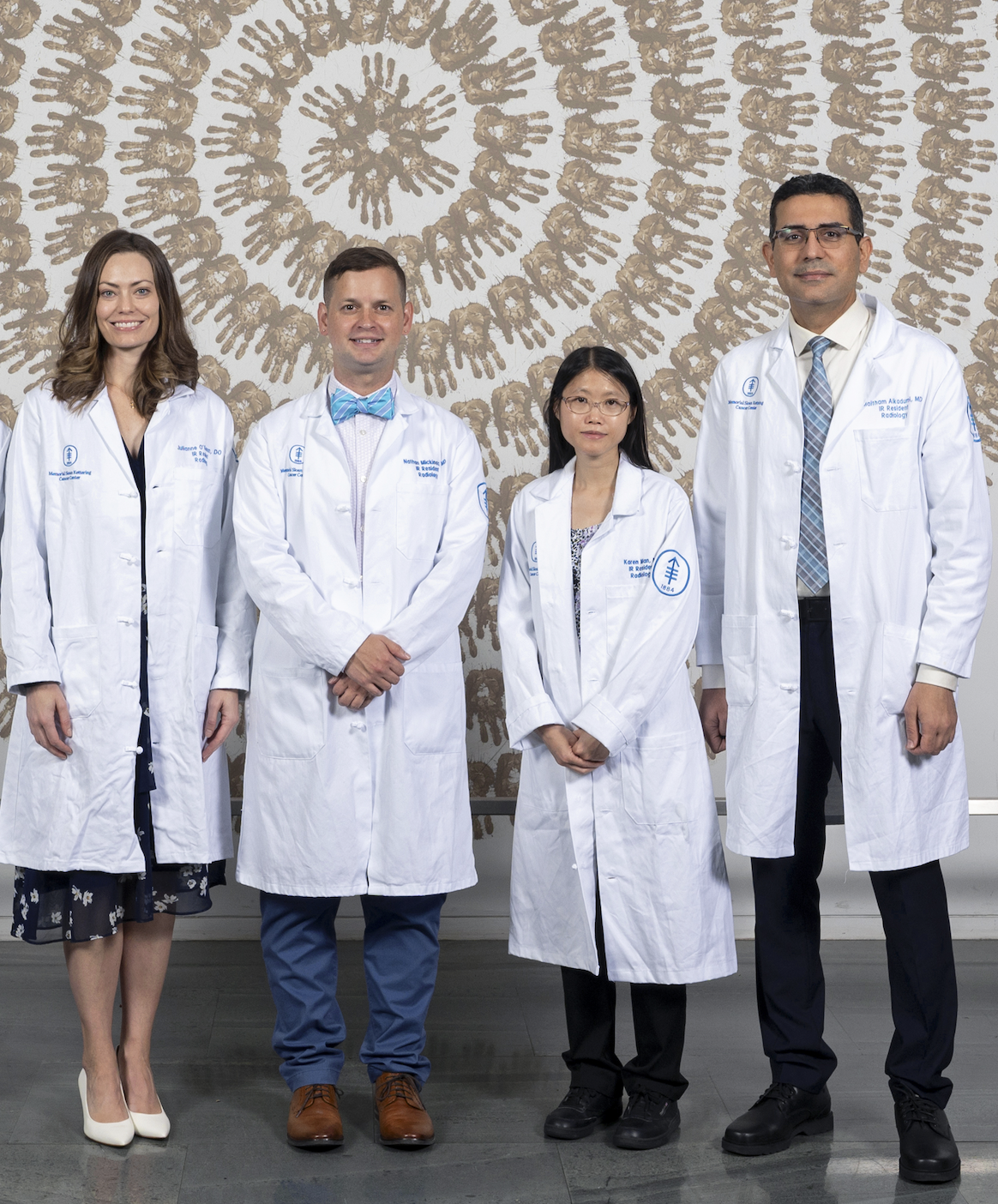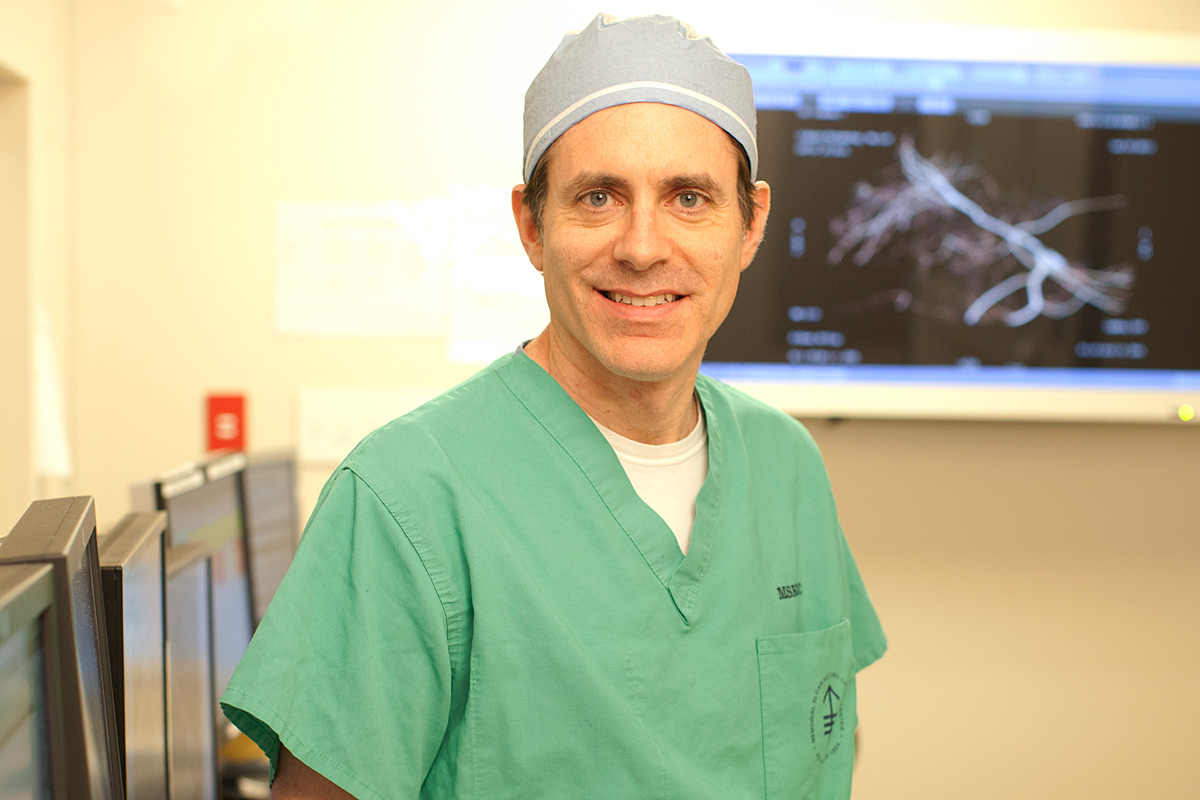The ACGME-accredited Independent Vascular and Interventional Radiology (IR) Residency at Memorial Sloan Kettering Cancer (MSK) is dedicated to providing future interventional radiologists with complete IR training that encompasses the broad spectrum of IR, including but not limited to oncology, vascular care, palliative interventions, and pediatric procedures. At a time when many IR programs have lost much of their vascular procedures to turf battles, with specialties such as vascular surgery and cardiology adopting parts of traditional IR practice, including peripheral artery disease, MSK’s IR training uniquely provides vascular experience to trainees. Our IR residency boasts an extensive vascular program that comprises chronic and acute deep vein thrombosis, pulmonary embolisms, and peripheral arterial disease, including limb salvage.
Our residency program has trained many distinguished IR specialists who have entered private practice or academia and have gone on to become leaders and experts in the field. MSK’s academic programs and resources, tradition of clinical and scientific excellence, and high-quality procedures and subspecialty programs provide residents with a supportive and collaborative environment for clinical learning and scholarship. In addition to offering unparalleled oncologic training administered by world experts, MSK has taken a conscientious and proactive approach to providing the most holistic IR training program around.
Mission Statement
The IR residency program prepares residents for a successful career in IR by teaching them:
- The role of image-guided interventions
- The multidisciplinary options to perform image-guided interventions independently
- How to use clinical skills to support the establishment of an effective, patient-centered private, academic, inpatient, or outpatient IR practice. Providing thoughtful and compassionate professional care as a clinician and in support of colleagues.
Program Aims
- Create an environment for IR residents to gain proficiency in the independent performance of image-guided interventions by leveraging dedicated support from leadership, attendings, practice extenders, ancillary staff, and institutional and departmental facilities and resources.
- Promote lifelong learning to understand the role of image-guided interventions, multidisciplinary options, and effective clinical management of patients through didactic lectures, conferences, morning rounds, self-guided learning, and patient care.
- Train IR residents on thoughtful and compassionate patient-centered inpatient and outpatient clinical care by requiring patient ownership, evaluation, and management.
- Cultivate a desire for quality research- and evidence-based practice by securing protected time away from procedure rooms to recuperate, learn, and conduct research.
- Encourage professionalism and productive interpersonal and communication skills.
Program Description
IR residents choose the procedure rooms that best align with their learning journey on a daily basis. Room selection is based on a rotating hierarchy picking system; on the first day of the week, the resident has the first pick of rooms; on the second day, they have the second pick; on the third day they have the third pick, and so on and so forth. Daily choice options include four hybrid rooms, as well as two advanced standalone fluoro suites and a positron emission tomography (PET) procedural suite at the Main Hospital, three hybrid rooms, a PET procedural suite at the Koch Center, and the American Endovascular Office-Based Lab (OBL) in Harlem, New York, with Dr. Joseph Shams and Dr. Noam Spinowitz. Residents see patients before their respective procedures and follow the patients through sign off, establishing patient ownership and care.
IR residents also regularly take part in the IR clinic, where they see patients both virtually and in person, and read for the Vascular Lab, which prepares residents to sit for the Registered Physician in Vascular Interpretation (RPVI) exam. Residents enjoy a post-call, out-of-rooms day for research and investments in well-being. They typically complete at least one research project to present at meetings and produce author papers. In addition, there is a two-month rotation at NewYork-Presbyterian/Weill Cornell, where there are additional opportunities experience with consultation and non-oncologic interventions.
Why Choose MSK for IR Residency Training
- World expertise and training in oncology treatment modalities, including ablation and embolization
- Large, comprehensive range of vascular interventions, such as acute and chronic venous disease, pulmonary embolisms, peripheral arterial disease (including limb salvage), dialysis access, and portal hypertension
- Innovative interventions (i.e., neuro infusion, meningeal artery embolization, cementoplasty with screw fixation)
- Bread and butter interventions (i.e., treating bleeds, abscesses, placing nephrostomies, biliary catheters and stents, and performing lymphangiograms, kyphoplasties, biopsies, venous access, and pediatric interventions)
- Attendings dedicated to the success of trainees, both at MSK and in the future. Active investment in helping residents find great jobs.
- Autonomy as conferred per the ability of the growing resident
- Practical strategies for well-being
- Inclusive and diverse environment
- Advanced physician providers support for residents, to optimize patient care during training
- Training in the Vascular Lab to support resident study for the Registered Physician in Vascular Interpretation (RPVI) exam
- Strong research environment with resources to present at conferences/medical meetings and publish
- Subsidized housing near hospitals
- High-end procedure suites, including hybrid rooms (fluoro and CT in one room) and PET scans for PET-guided biopsies and ablations
- IR clinic where residents see patients virtually and in person
- Dedicated office space with Picture Archive and Communication System (PACS) and dictation
- Daily morning rounds to present past and present patient cases at weekly tumor boards, monthly Mortality and Morbidity conference, monthly didactic, and monthly inter-institutional case conference
- Within a vibrant, bustling city with lots to do
Life on the Upper East Side
Memorial Sloan Kettering Cancer Center offers housing to incoming IR residents in the immediate vicinity of MSK’s Main Campus on the Upper East Side of New York City. The Upper East Side is a very safe neighborhood with ample access to the waterfront (East River jogway/walkway) that is in walking distance to Central Park and home to many families with young children, as well as excellent schools. Many world-renowned hospitals in addition to MSK’s — including NewYork-Presbyterian/Weill Cornell, the Hospital for Special Surgery, and Rockefeller University — reside in the Upper East Side. The rest of the city is easily accessible via subway, particularly from the number 4, 5, 6, F, and Q lines.
Residents on the IR Program
“The training program at MSK provides a great deal of autonomy and is particularly robust in advanced vascular and oncologic interventions. Additionally, our rotations at Cornell and several office-based labs through American Endovascular provide us with broad training in various practice settings. As a result, I feel well-prepared across the gamut of IR procedures. Additionally, due to the diverse and accomplished faculty, trainees have excellent mentors, which enable clinical and career advancement.”
—Akshaar Brahmbhatt, MD, Independent IR Track
“Since day one at MSK, I’ve felt welcomed and supported by amazing people who are dedicated to their patients, knowledgeable, and always working as a team. Everyone loves to share their knowledge and at the same time, gives you enough autonomy, which is so important during the last year of training. The variety of the procedures we perform daily, experience in the clinic or outpatient PAD [Peripheral Arterial Disease] center, multidisciplinary conferences, and research work altogether give me great confidence that I am well-prepared to become an independent interventional radiologist.”
—Agnieszka Witkowska, MD, Early Specialization in Interventional Radiology (ESIR) Track

Pictured from left to right: Interventional Radiology residents Julianne O’Gorman, Nathan Mickinac, Karen Man, and Maitham Alkadumi.
- Maitham Alkadumi
- Karen Man
- Nathan Mickinac
- Julianne O’Gorman
How to Apply
We welcome applicants to apply to the IR Residency via The Electronic Residency Application Service (ERAS; ACGME ID #: 4153500007, called: Memorial Sloan Kettering Cancer Center Program). We accept residents on both the one-year Early Specialization in Interventional Radiology (ESIR) track and the two-year Independent IR Track. The recruitment process is merit-based and inclusive, with the utmost emphasis on eradicating bias based on race, gender, sexual orientation, ethnic origin, etc. We interview a wide range of applicants with various backgrounds irrespective of program, board scores, or research.
Service Chief


